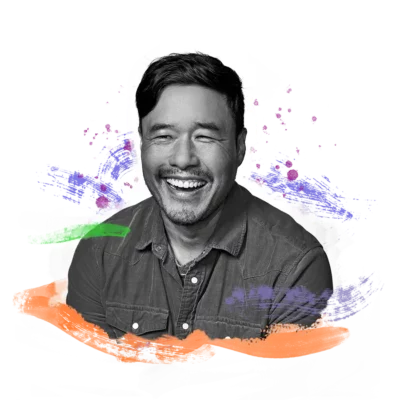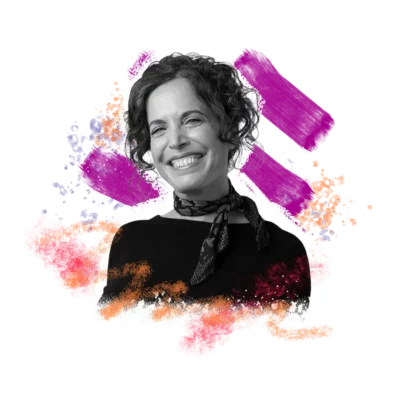Stay authentic to yourself
How do you create something an audience will love? Start with everything YOU love. Actor Randall Park (“Veep,” “Fresh Off the Boat,” “WandaVision”…) tells the story of a passion project that’s become a beloved repeat-watch: the 2019 Netflix movie “Always Be My Maybe.” It all started as a tossed-off remark by his friend Ali Wong: What if we made a romcom together? As Randall and Ali wrote the movie, they celebrated what mattered to them: family traditions, the food and music they love, even their favorite movie stars. Learn how you can take what authentically matters to you – and create work that will resonate for others too.
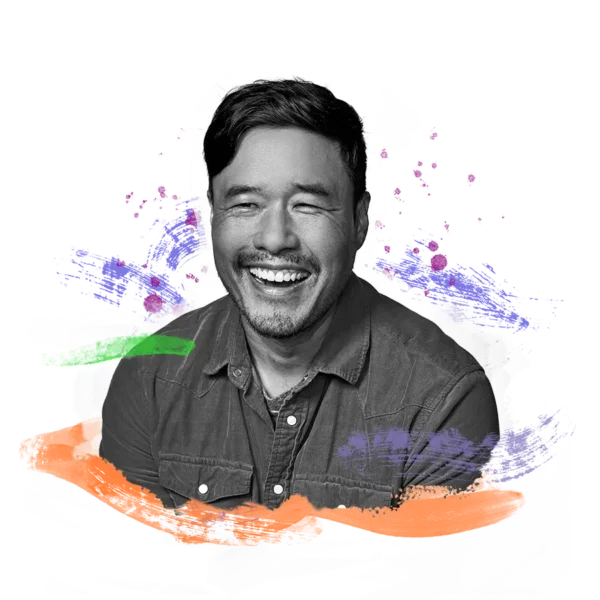
Transcript
Table of Contents:
Transcript:
Stay authentic to yourself
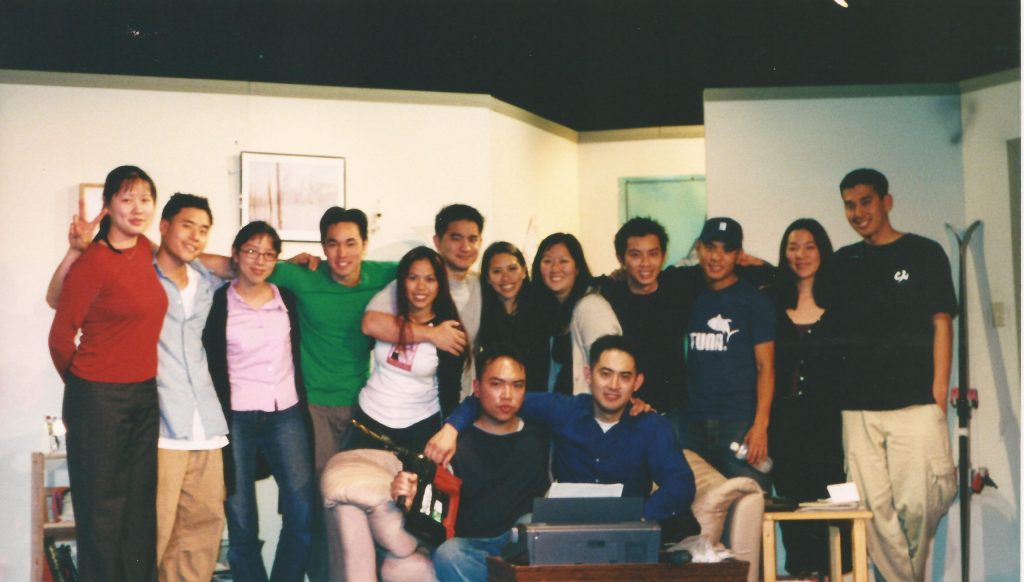
A cast photo from the student theater troupe LCC (short for “Lapu, the Coyote that Cares”), which Randall Park founded in the mid-1990s at UCLA. Randall himself is at the far left in a light-blue shirt, yes, making a peace sign. Photo courtesy Randall Park.
Chapter 1: We got to be heroes
RANDALL PARK: It was my first time on stage. It was the first full length play that I ever wrote. It was called “The Treehouse Bachelor Society.” It was very absurd, political, there were musical elements. It was very silly. It was everything I wanted to write in one play. I wasn’t the lead of that play. In fact, I was just the narrator. But I had never, before then gotten laughs performing on a stage. It felt just incredible. It felt like a drug.
I had found this Asian American community at UCLA and we started this theater company on campus where we wrote our own original stuff, called Lapu, the Coyote that Cares Theatre Company, or LCC. It was mostly for non-theater students, but they all had an interest in expressing a creative side. Through this company, this Asian American company, we got to play everything, we got to be heroes, we got to be villains, we got to be sidekicks, we got to be in the background, in the foreground, and we would pack the theater. There’d be lines snaking around the campus for these shows. I mean, we made a lot of mistakes and I’m sure the plays, looking back on them, were not that great, but I remember afterwards just feeling so exhilarated, like I was floating. We all were floating.
JUNE COHEN: That’s Randall Park, and he’s about to tell us the story of writing and starring in “Always Be My Maybe” – the beloved movie he made with comedian Ali Wong. It’s a specific story of a Korean-American writer and actor finding his place in an industry without a lot of options for him. But it’s also a universal story of how breakthroughs come in any field when you keep your passion projects alive.
As Randall takes us on the journey that leads to “Always Be My Maybe,” you’ll hear how he responds when opportunities run thin – how he assembles his own dream teams for his own dream projects – projects that are utterly authentic to him. And you’ll also hear how he brings the mindset of a passion project to the rest of his work too – surrounding himself with good people, doing good work. And always following the steady mantra: Be authentically yourself.
And here’s what you need to know about Randall Park: His first breakout role was playing the Dad on the TV series Fresh off the Boat. And now you’ll recognise him from Wandavision – and elsewhere in the Marvel universe. Randall’s about to direct his first feature film. But the Netflix movie “Always Be My Maybe” holds a special place for him. It’s an homage to “When Harry Met Sally” and Randall created it with his old friend, the brilliant comedian Ali Wong. As you’ll hear, it’s one of the few films in Hollywood history that was created because fans demanded it.
The piano you’ll hear in the episode is our composer Hil Jaeger, who’s playing along with this story. And for visuals while you’re listening, go to sparkandfire.com/randallpark.
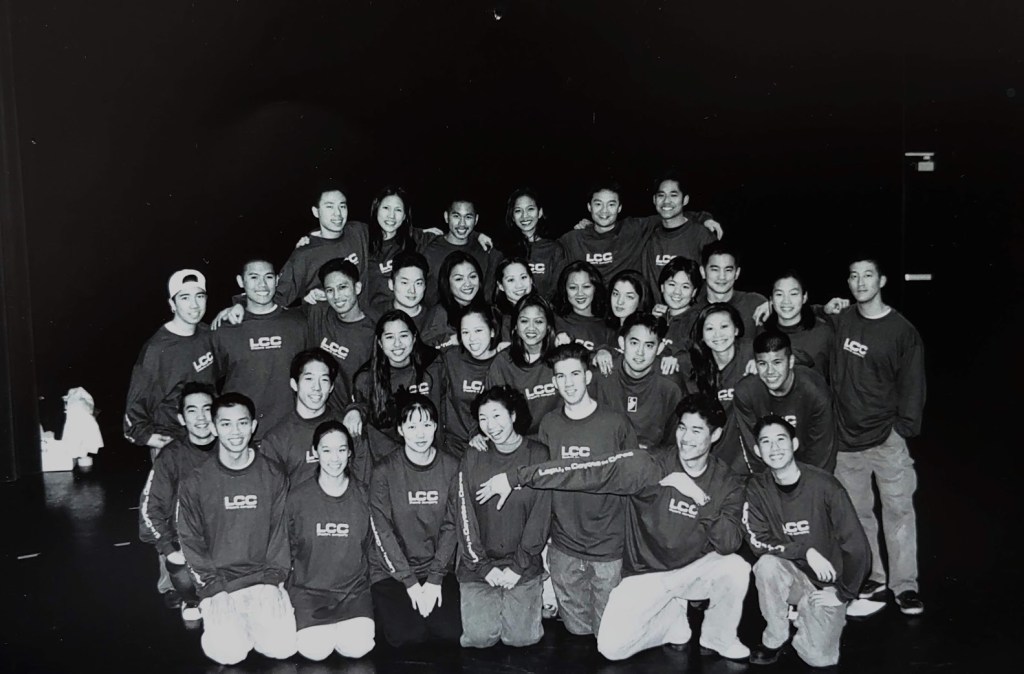
LCC, the theater troupe Randall co-founded at UCLA in the early ’90s, is still going strong! Follow them on Instagram at @lcctheatre
Chapter 2: Typecasting
RANDALL PARK: I had been working regular jobs, doing graphic design, I was doing posters at Cedars-Sinai Hospital but really wanting to act and perform. But I was scared of actually pursuing it and I got laid off. I had just broken up out of a long-term relationship and I felt like, “Ah, I kind of have nothing to lose. I’m just going to go for it.”
I had heard that there was this school that was “the” place to go if you wanted a career in this business. I scrounged up the money to take this class because I felt like it will be an opportunity. You had to do a weekend intensive, workshopping with the teacher who was kind of this guru-like figure. It was predominantly white students, I was the only Asian guy in there. And at the end of the weekend, they did this exercise where a student was in front of the classroom sitting in a swivel chair with their back turned to the rest of the class. They were to simply spin around face the class and everyone in the class say the first thing that comes to mind. It was a lesson in marketing, the way people see you initially is most likely what you’re going to be cast as. And once you know what you’re going to be cast as, you can kind of know how to present yourself to the industry.
This really good looking guy in class would sit in that chair, spin around and everybody would immediately say like, oh, he’s a cowboy. He’s a detective on the case. He’s a lover. He’s a hero.
It was my turn and I sat in that chair, I turned around: He’s a nerd. He’s a scientist. He’s a tutor. He’s a computer programmer. One person said he’s a child molester, which really boosted my self esteem. Everything that was said was stereotypical, was not how I saw myself – and it was not what I was used to, coming from this background where I got to play everything and everyone.
There was truth to that exercise. It did teach me how the industry at the time saw me and the people in that class were lovely. But they were doing the exercise, and the exercise was to not censor yourself and that’s what they were doing. And it’s definitely a reflection of this industry – a lot of good people, they’re just doing what they think they’re supposed to do.
After that exercise, the head of the school would call you into her office and come up with a log line for you: “This is your thing, take the log line and run with it into this business.” I came out of that meeting without a log line. It was so discouraging for me and made me feel like, oh gosh, I wonder if there is a place for me in this business. I don’t even have a log line.
JUNE COHEN: Did you notice the tone in Randall’s voice when he said “That’s not how I saw myself”? There was such an enormous gulf between Randall’s authentic creative self and the roles he was typecast for. And closing that gap – getting back to the way he felt during his passion projects at UCLA – that’s the theme you’ll hear again and again in the course of Randall’s story.
Chapter 3: I really need this job
How do you handle a string of rejections? Use it as fuel and stay on your path.
RANDALL PARK: I was broke, living with my parents. I was in dire need of a job for financial reasons, but also just for my spirit. This audition had come to me and it was for a series starring Ted Danson. It was a sitcom called “Help Me Help You,” and it was for a one-day guest star role. I go to the audition, I’m sitting in the waiting room, usually super nervous before any audition, but I had worked so hard on this audition. It really played to my comedic strengths. It was non-stereotypical, which was really refreshing, and it was so perfect for me that I actually felt okay. I felt like, “This is going to go good.”
I get called into the audition. I remember doing the scene and feeling so locked in, but also feeling so free that I was able to improvise, and the actor that I was reading with was able to play along. While it’s happening, I’m feeling so exhilarated and alive, and I’m feeling like, “Oh gosh, this is what a great audition is. I’m acting. I’m not auditioning, I’m acting.” I come out of that audition and I go home just feeling like I got that job.
With acting, when you don’t have the part, they don’t call you to tell you you don’t have the part. They only call you to tell you when you do have the part. The day passes, I don’t hear anything from my agent. Tomorrow comes, I don’t hear anything. Friday comes, I’m getting antsy at this point. I call my agent, he says, “Okay, you’re still in the running. In fact, it’s down to you and one other actor.” And I was like, “Oh, who’s the other actor?” And it turns out that this actor is my friend, Eddie Shin. He was also in this theater group. Eddie is a fantastic actor, way better than me, I was like, “Oh no. Well, you know what? I think it’s okay because what I did in that room, no one else can do. I did me.”
So the weekend passes, Monday comes, Tuesday comes, Wednesday comes, I hear nothing. At the very end of the day I was like, “I got to call my agent.” And he says, “Yeah, you didn’t get it,” and I remember feeling like I just got hit by a truck, just dropping the phone and collapsing into that couch and crying. Just breaking down. And out of everything I’ve experienced throughout my entire career, that was the darkest moment, and it was really just for a six-line role for one day, for a show that immediately got canceled, that most people don’t even remember. But for me, it meant so much more than that. It was going to be my sign that I was doing the right thing.
When you have experiences like that, you have to feel like crap. That’s just you being human. You can either use it as fuel or you can let it bog you down and eventually take you out of the game. I actually quit shortly thereafter. I always drew a lot as a kid and so I was like, “I think I’m going to try to become an architect.” I remember going to Santa Monica College and having to take basic physics in order to even apply to architecture school and I remember just being completely lost – I couldn’t get any answers right – and quitting after the second day of that class, thinking like, “Gosh, I have nothing else to offer the world at this point, other than acting,” and quietly stepping back on the battlefield with my head down: “All right, time to go to war.”
Chapter 4: Back on the battlefield
What can you do when opportunities don’t come your way? Assemble your own dream team for your own passion project.
RANDALL PARK: I just started writing. There was a monthly web series competition in L.A. called “Channel 101” where you’d make a pilot of a web series. I would gather friends and I just started making a lot of stuff.
You have a month to make these episodes to write it, to cast it, to shoot it, so I learned about fast filmmaking during that time, and also how to write real fast. They were always in that same voice that I had in college, which was super comedic, and really dumb and absurd with fake mustaches and extremely low budgets but for me, exposing the budget was always a fun thing to do in these scripts, and they’d screen it in front of a live audience and the audience would vote on whether they’d want to see the next episode or not, and I just kept submitting things and a lot of my things got voted on so I would just keep making more episodes.
I got married, and my wife and I had a baby. We were hunkered down, making sure to keep this baby alive. Why not make a web series that had my baby in it and my wife in it?
I got a friend named Tim Wilkerson, who’s this great filmmaker, and we joined forces and made this really dumb web series called “Baby Mentalist.”
There was a show at the time called “The Mentalist,” which was about this really smart detective, and I thought, “Okay, why not make our baby this really smart detective?” The conceit of the show would be we just sit her there and act around her. It’s just one shot, take her out, put a doll in her place, and act with the doll for most of the scenes.
It just kept getting voted back. They wanted to see more and more episodes. And eventually my baby started to walk and I was like, “Well, let’s work this into an episode where the baby actually walks for the first time to save her parents.” It was definitely more violent than it should have been. I felt very empowered by making my own stuff, which was always my dream – just to work with my friends. I just saw it as an opportunity to keep acting and to keep writing, to write just dumb, fun things with my friends.
JUNE COHEN: Did you notice Randall’s mindset as he started writing shows for this competition? He didn’t obsess over what the audience would vote for. He felt empowered to make it his own passion project, and just set out to delight himself. In his case, that meant absurd, comedic films with fake moustaches. It also meant performing live and working with his wife and friends. It’s worth asking yourself: What are the ingredients of your passion project?
After the break: The breakthrough role, and Ali Wong appears on the scene.
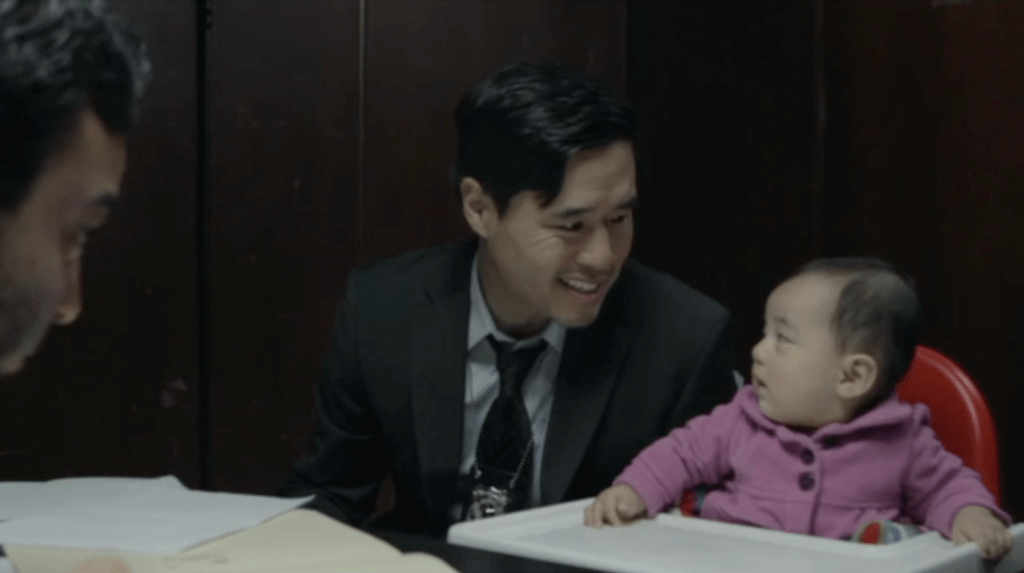
Randall Park and baby Ruby as a pair of hardboiled detectives, in the web series Baby Mentalist.
Chapter 5: When Randall met Ally
RANDALL PARK: Gosh. I love so many things about “When Harry Met Sally.” I mean really, to me it’s a perfect movie. Billy Crystal and Meg Ryan, just their dynamic was just, so funny, but also everything they go through just felt very real to me. And the setting of New York City, I still see it as this kind of magical place. And that movie really captured, I guess my fantasy version of New York. The music. You know? All of the jazz standards throughout that movie. Harry Connick Jr. – first concert I ever went to was a Harry Connick Jr concert. I don’t know if that makes me cool or not. Probably not, but I just loved that soundtrack. Yeah. Just everything about it. Everything about it. Yeah. A man and a woman can absolutely be friends. I believe that, and my life is proof of that.
I had met her, I think it was just at a party for members of that theater company that I had co-founded at UCLA. Ali Wong was a member of that theater company. And we became friends, and over the years, we’d hang out and eventually she moved to San Francisco, became a stand-up comedian out there. I started doing standup in LA, and every time I’d go to San Francisco, I’d hang out with her and she’d take me around to all the rooms to perform in and we’d perform all around the city. Throughout the years, we’d keep in touch, and we had always remained friends. And we always talked about, “We got to do something together. Let’s create something together.” We never actually got to doing it.
Eventually I was cast in a show called “Fresh Off the Boat.” I remember talking to the producers about Ali Wong, they loved her and she joined the writing staff of the show. I’d be shooting the scenes, I’d drop by the writers’ room, I’d see Ali, we’d hang out. It’s just so cool to have an old friend there.
Eventually, “Baby Cobra” came out, just one of the great standup specials of all time, and just took her off into another stratosphere. She was being interviewed for a profile in the New Yorker. During the interview, she was asked: What does she have planned next? And she just off-hand mentioned that, “Randall Park and I have always talked about doing a movie together. It may be a romcom.” The article comes out, and a bunch of other publications zero in on that one section of the article and they write their own pieces, basically dear Hollywood letters saying, “Please make this movie.” And that became viral online. Everyone was clamoring for this movie to which we didn’t even have a script.
I was excited, I was surprised, I was touched that I was in the equation, but I also was pretty sure that it was a testament to Ali Wong and just the love that people have for her. And also a desire to see Asian Americans depicted on the big screen as a couple, it was something that was novel at the time. “Crazy Rich Asians” hadn’t come out, we just hadn’t seen a love story with an Asian American couple that was new and exciting, on top of these are two funny people. After being in this business for so long, moments like this I cherish, but I don’t expect anything to come out of it.
Next thing you knew, Ali’s team and my team get calls from all around town basically asking for the script. And Ali and I were like, “We don’t have a script.” I remember talking to Allie and saying, “Hey, why don’t we just write it?”
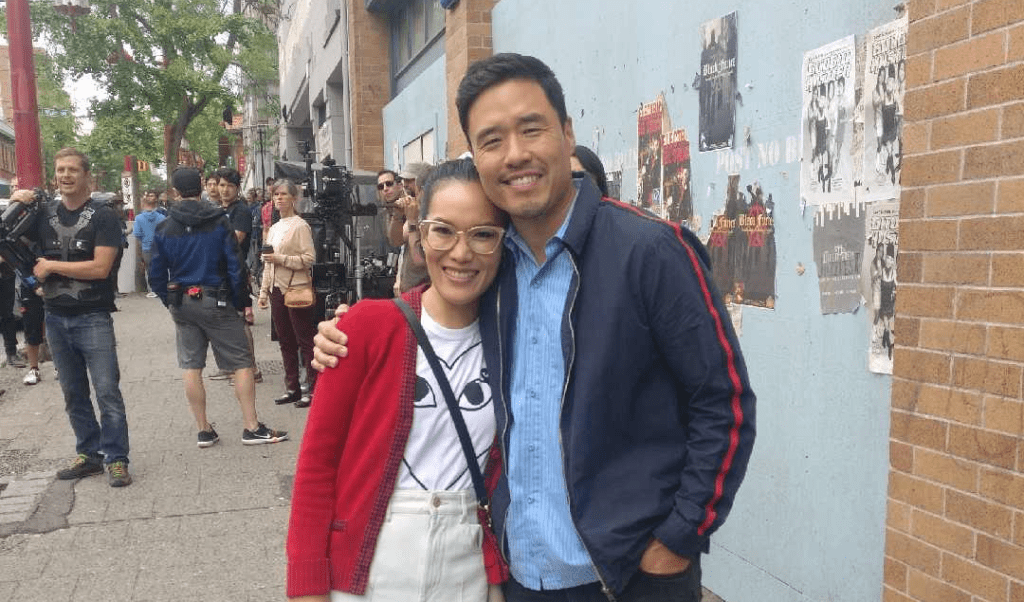
Ali Wong and Randall Park on set in “San Francisco,” probably actually Vancouver, in June 2018. Photo courtesy Randall Park
Chapter 6: We just write it
How do you create something an audience will love? Start with everything – really everything – that you authentically love.
RANDALL PARK: We just hunkered down. We would meet at different WeWorks, and we would sit together and just bang out this outline.
At that point, we had read so many scripts in our lives. We kind of knew how it worked, but we didn’t go in there with too much thought of that. We just tried to make each other laugh, which had been our relationship since the beginning, just having fun, being stupid. And we put everything down, if it made us laugh, we put it down.
Early versions of that script had some wild stuff in it. I write a lot of animals into things that I write for some reason. I like babies and animals, and I remember pitching… Gosh, I don’t even remember how we got to this point. But at the climax of the movie, my character was stranded somewhere and a bear had come to attack me and Ali’s character arrives in a helicopter. It was just so ridiculously absurd, but we kept it in for a while because it made us laugh so much. That was the process: just if it made us laugh we’ll put it in there and once we have a draft we’ll start pulling back on certain things and pushing some things out.
There were two movies we talked about a lot, which was “When Harry met Sally,” and we talked about “Boomerang” with Eddie Murphy. It was just so funny throughout, there were some wacky characters. That’s where characters like my girlfriend in the movie played by Vivian Bang, these larger than life side characters came out of that influence.
When we started writing, we weren’t setting out to fight stereotypes. We just wanted to tell a story. We even talked about it, “Our job here is not to dispel myths. Our job is to tell a story that is as authentically us as possible, and in the process, we’ll probably fight some stereotypes.”
Ali and I, we both come from Asian American studies backgrounds, we both have some very similar points of views on what it means to be Asian American, so we knew those things would come out no matter what. We just wanted to write something really fun, and heartfelt, and funny.
After maybe a couple months, we had a good outline and we called up our friend, Mike Golamco. Mike Golamco was also a member of that theater company from UCLA. And we were like, “Mike, you want to write this with us?” And Mike was like, “Absolutely.” So the three of us would sit in these tiny conference rooms and just work away at the script.
I’d say we wrote that script in half a year. We really sped through it. We were motivated because we knew people wanted to read it, and we were also having a lot of fun. I mean, it was work, but it was fun work. Eventually we had a script.
JUNE COHEN: Did you notice what Randall and Ali didn’t do as they started on the script? They didn’t get hung up on what a studio would want. They trusted that they knew how to write a script with strong characters and a narrative arc. But they set that aside, at first, and treated it like a passion project. They saw their jobs to be as authentically themselves as possible. And for them, that meant making each other laugh.
Chapter 7: The details that bring it to life
How do you make work that feels authentic? Ask questions about your own life that the project can answer.
RANDALL PARK: It was really important to us to make it as real and authentic as possible and in order to do that, we wanted to pull from our own experiences. The dad’s name is Harry. My dad, his name is Harry. Blue collar, hard worker, just tries to do a good job. I always thought of myself as this blue collar working actor. That was my dream, was just to work. That’s how I saw myself and I think that really informed my character. The fact that he’s in these overalls. That’s how I see myself and my career. I am essentially in these overalls, just trying to do a good job.
My actual mom is an artist. She’s a painter. I grew up in a house where there were a ton of canvases leaning up against the wall, there were oil paints everywhere, easels. It just felt natural to put that as a detail for my mom in the movie. I took photos of my mom’s actual paintings and sent them to the art department and they made spot-on recreations of those photos, which was so mind blowing.
When I was out of college, a group of friends and I, we started this band. We played at clubs all around L.A., but we didn’t have drive at all. We were trying to figure out my character and I thought, “Oh, well, what if he’s just this guy who’s in a band, a struggling band?” And essentially it answered the question: Well, what if my band kept going? What would that band be like? Well, the band would be like the one in the movie, still struggling, still essentially a garage band stuck in San Francisco.
The name of the band is Hello Peril, which is a take on the term Yellow Peril, which a lot of people actually caught, which I was very thrilled with. The Bay Area rapper named Lyrics Born, he was somebody I really wanted to be in the band because he was this Bay Area legend, and I was such a fan of his music, especially his rapping. His lyricism to me was just so playful and fun, and we somehow got him in the band.
We got some great actors to play band members: Karan Soni, Charlyne Yi, who is just a hero of mine. And we were figuring out, “Well, who’s going to create the music?” And one of us pitched a producer named Dan the Automator. He’s this legendary Bay Area producer who had done just a bunch of classic hip hop records, and we somehow got him. We’d hang out in his studio and we’d record the songs. I’d be like, “Oh my God, I’m in Dan the Automator’s studio. This is insane.”
When we got to talking about well, who could actually play this larger than life side character? Just so ridiculously absurd. We were bouncing around a bunch of ideas. We wanted someone who was Asian American. We wanted someone who was larger than life. The executives at Netflix said, “Just put in the ideal person, and we’ll try to get him. And if that person was one of the biggest stars in the world, that would be great. Most likely not going to happen, but that would be great.” So, I mean, immediately it was Keanu Reeves. We somehow got Keanu Reeves. Again, everything just clicked.
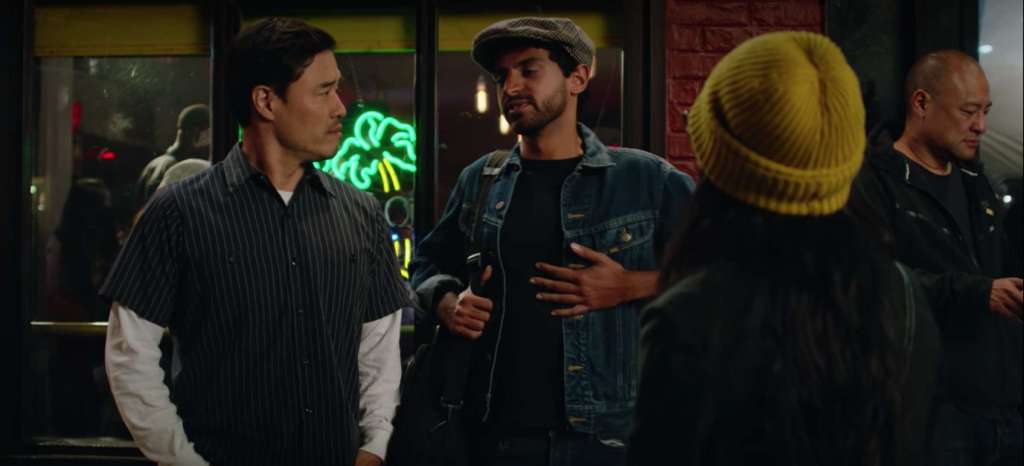
Outside his Hello Peril show, Randall’s character Marcus talks with a bandmate played by Karan Son. But hip-hop heads will recognize the musician at far right: legendary producer Dan “the Automator” Nakamura, who produced the music the band plays in the film. A few more Bay Area hip-hop Easter eggs are explored here. Image: Netflix.
Chapter 8: Was it a premiere? Or a reunion?
RANDALL PARK: Gosh, oddly enough I wasn’t that nervous walking into that theater during the premiere. I had a strange sense of calm and peace about me. The journey was so amazing and I felt really good about what we made. It all felt like it was supposed to happen. It was at Westwood Village, where UCLA is, which was very surreal because I see the direct line connected to our very first show at the Northwest campus auditorium, just hearing the audience laugh at something that we made, and here we were doing it again but on a much larger scale.
I mean, they went all out. It was like a huge studio, Star Wars type of tentpole premiere. Keanu Reeves was there, there were photographers everywhere, it was very exciting. But to me, what was more exciting was we had all our friends from the old theater group there. A lot of old friends from UCLA. We had members of the current LCC theater group come to the premiere to show them what’s possible.
And then Ali and I sat in that theater and were amazed at just how much they loved it. It was just uncanny how everything just was really a celebration and a dream come true on so many levels, but yeah, yeah, that was fun. This was all just the reward. Yeah, the struggle came before.
Chapter 9: You do you
RANDALL PARK: “Always Be My Maybe” is a reminder to me of the importance of surrounding yourself with good people, and making things with good people and trying to come from an authentic place and using that in your work. Pull from your life as much as possible, the experiences from your life, the people from your life. That’s a fun way to live.
I used to give the advice, up until recently even, to aspiring actors who seek advice from me. I used to tell them to not quit. Perseverance is the key because you’re going to get hit at all angles and you’re going to want to quit but if you stay in the game, you’ll be rewarded for that. That’s life and that’s basic physics.
But I’ve changed my stance on that. My advice now would be keep persevering at what makes you feel most like yourself. If you’re pursuing an acting career and you come to the realization that this isn’t me, then it’ll be a great blessing for you to quit. And there’s no shame in quitting and finding something else that fills you up.
But if you know it’s you and you have no choice but to persevere and to struggle at it and to find success at it, then I don’t need to tell you not to quit. You just won’t quit. But I will say, do what… essentially, do you.
JUNE COHEN: I want to thank Randall for sharing the story of this creative journey with us. And I want to thank you for listening. I hope you found things in it that you can bring into your own creative practice.
Whether it’s the way Randall assembles old friends to form dream teams on his own passion projects or the way he sees himself as a “blue collar actor,” showing up, doing good work and keeping good people around him.
Maybe it’s the way Randall persevered against the odds and didn’t accept Hollywood’s typecasting. Or maybe it’s just the way Randall and Ali started out with the simple goal: to make each other laugh. It’s a reminder of what happens when you treat all of your work like a passion project – and stay authentically true to yourself. Trusting that the audience will follow.
Whatever you took from Randall’s story, we’d love to hear it. Tweet it to us @sparkandfirepod. Or email me at [email protected]. If you want to share this episode with a friend or collaborator, use this link: listen.sparkandfire.com/randallpark.
